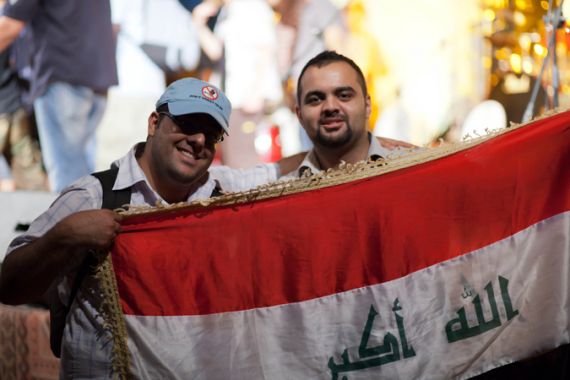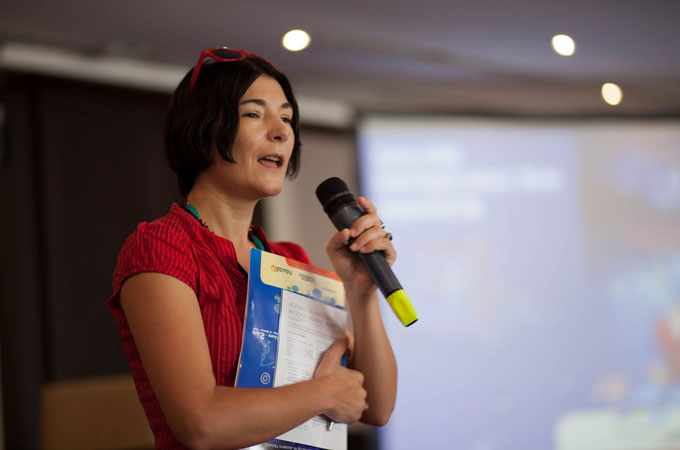Sharing the ‘Arab Spring’
Artists and open-source activists met in Tunisia to celebrate new-found freedoms and promote openness and sharing.

 |
| Donatella Della Ratta, regional manager of Creative Commons, said the meeting was an important milestone [Joi Ito] |
With the world’s attention focused on ongoing uprisings in Libya, Syria and Yemen, some may have forgotten the birthplace of the “Arab Spring” – Tunisia. On January 14, Tunisians kicked out their president and inspired uprisings across the region.
On June 30, over six months later, stakeholders from across the region gathered in Tunis for the Creative Commons (CC) Arab regional meeting, an annual gathering of CC communities from across the Arab world.
Keep reading
list of 4 itemsUK returns looted Ghana artefacts on loan after 150 years
Fire engulfs iconic stock exchange building in Denmark’s Copenhagen
Inside the pressures facing Quebec’s billion-dollar maple syrup industry
Creative Commons is a non-profit organisation that oversees the creation and evangelising of the licensing scheme used by Al Jazeera, the White House, Wikipedia and Flickr, among others.
Also at the meeting were Arab musicians and artists who created and remixed music and visual art in a celebration of “openness, creativity and innovation”.
Joi Ito, chairman of Creative Commons, told Al Jazeera that while the core of the organisation was technical and legal tools to enable sharing, the purpose of the Tunis meet was to enable the community and creators of content.
“It’s good to see our meetings evolve from technical and legal discussions to the creation of content, and also to the see the region’s understanding and acceptance of Creative Commons,” Ito said.
“We started working with a small group of people in 2007, and now we have a broad and diverse community in the Middle East. The co-incidence of the Arab Spring and the freedom that it symbolises, which is also the core message of Creative Commons, worked really well.”
Celebratory concert
A concert after the meeting saw a mix of various genres, including pop, hip-hop, rock and classical Arab music, by artists from Tunisia, Morocco, Egypt and Palestine all performing together.
Rafik Ouerchefani, a Tunisian journalist and open source enthusiast, said that something like this would have not been possible a few months ago.
“The Tunisian people lived in a sort of island, completely disconnected from the world and especially the Arab world. The exchange was strictly controlled,” Ouerchefani said. “It was really cool to gather people from all over the region to share their knowledge and passion for freedom. At the concert, the Palestinians moved everyone profoundly with their songs.”
However, Ouerchefani also expressed concern about the state of copyright in Tunisia, saying that the government used to steal others work and allowed the illegal use of varieties of products and contents.
“The big software companies – especially Microsoft, which had and still has a strong lobby in Tunisia – never combated this flourishing piracy. It was a way for them to advertise their buggy software to the public – undermining free software,” Ouerchefani said.
“Yet at the same time, they sell licenses to the government for millions of dollars each year.”
Big backers
Microsoft has a strong base in the North African state. During a visit in March, Secretary of State Hillary Clinton told Tunisians that the United States was “ready to assist in any way”.
Clinton said that Microsoft would work with Tunisian civil society groups to expand information and communications capacity across Tunisia by providing computers, software, training and other technical assistance.
Ouerchefani, who is the founder of Mozilla Tunisia, sees these developments as a direct threat to the open-source community and hopes that the growth of Creative Commons will help to reverse the tide.
“The use of permissive and author-respectful licenses like Creative Commons will definitely help in shaping the future of entire industries,” he said.
Donatella Della Ratta, the regional manager of Creative Commons, said that the Tunis meeting was yet another important milestone for the organisation in the region.
“We are making good progress in the Arab world and will soon have an unported licence in Arabic. In Egypt, the licenses are done already,” she said.
“Our meetings are usually very legal and serious – this time we saw Creative Commons at work. We saw the idea of CC being created by musicians, artists and other creative people. We now have two songs that were created by artists from all over the region.”
Creating and sharing
The music created at the meeting will be made into a CD and licensed under CC – this will “encourage Arab youth to share music legally and also produce their own, through peer-collaboration and remix”.
Yasser Shoukry, an Egyptian folk musician who performed at the concert, said that because the Arab world is so big, people don’t generally know what others are doing.
“It’s important to bring people from all over the region together, to try and present something together that was related to the revolutions,” he said.
“And also to send a message to people around the world – we are all Arabs, and we are together and things are changing.”
Shoukry said that having the rare chance to work with Palestinians was a good reminder of the challenges that many people in the region still face.
“It was good to have Palestinians here, using music to express the anger they have due to the unfair treatment they face from Western countries.”
Nalan Sarraj, a student from Gaza, said that Palestinians feel left out of this Arab Spring.
“When I am here in Tunis I can see that the Arab people are serious about change and will continue to make history. The Tunisians are talking openly and freely now and you can see that they are heroes,” Sarraj said.
“One day we will make a Creative Commons event in Gaza and all the Arabs will be able to come.”
Follow Bilal Randeree on Twitter: @bilalr
All photos are used under a CC BY 2.0 licence, taken by Joi Ito. Here is a photo gallery from the meeting.